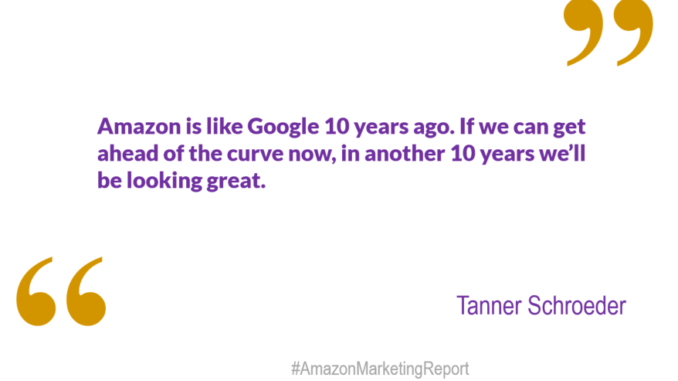
Why haven’t Search Marketers adopted Amazon Ads?
Paid Search exploded back in the 1990s and redistributed the roles in digital marketing. Incumbents had a hard time adopting this new type of performance marketing and legions of newcomers grew to take dominant positions in the market.
Fast forward to 2020 where Amazon Ads is exploding and where the new incumbents of paid search-dominated digital marketing advertising agencies are having a hard time adopting marketing on Amazon. Is there a new legion of newcomers coming to take power positions within digital marketing?
Back in 2018 when we researched the way leading teams in Paid Search operated, we noticed that they seemed to lag behind on adopting Amazon. Only about a third of the teams had any activity on Amazon at all whereas 80% of them were involved in Shopping campaigns.
Although we didn’t actually ask that question, we assume that 100% of them were present on Bing via Microsoft Advertising. According to our calculations, right around the same time, Amazon Ads overtook advertising on Bing and with the recently published figures for Amazon Ads and its’ growth of around 40%, Amazon Ads may already be twice the size of Bing in terms of advertising revenue.
So, what are the barriers to entry into marketing on Amazon for a Paid Search team? We tried to compare some of the dimensions of our 2018 research (“Major Trends in Paid Search”) on advanced search teams and our 2019 research (“Marketing on Amazon in 2020”) on advanced amazon marketing teams to look at some of the similarities and differences.
Comparing paid search teams to amazon marketing teams
To start with, let’s establish that they all agree on the importance of Data analysis. In both surveys, around 60% of respondents even had a dedicated data analysis role assigned to their projects. So far so good.
Process and change
On the aspect of the work process, there seems to be great differences and perhaps one of the biggest challenges for getting going on Amazon is the fact that it is a less structured process than for paid search. The advertising interface is younger and many describe it as something similar to an early version of Google Adwords. Marketers have multiple accesses to country accounts, merchant accounts and ad accounts to manage. Amazon Ads rolls out new functionalities and changes the way it functions at an amazing pace and it can be difficult to establish a firm process and automate it.
Paid search teams are in a more stable environment and our survey showed that they automate at a much higher degree than Amazon marketing teams. 25% of the automate anything they possible can and are building a sophisticated automation stack. They also have an established process for acquiring knowledge and adopting change: they work closely with Google and with Microsoft advertising. This is much more challenging for Amazon marketers. Agency teams on the Amazon side are more recent, less structured, change is frequent and marketers have adopted a philosophy of constant test and learn. There is a pattern in this: if you can build a structured process, you can automate, if the process constantly evolves, you must test and learn to keep building the process.
The work rhythm also seems to be different. Paid Search teams report monthly (50%), where 55% of Amazon teams report weekly or daily. Is it moving faster or does it simply require more frequent attention to stay or track?
Integration and attribution
As an extension to the process challenge, we believe we have identified an integration challenge: where paid-search teams are adopting an integrated approach, Amazon marketing teams are still very concentrated on a stand-alone Amazon marketing service.
Perhaps this strong focus on a single challenge is what also affects the attribution model used. Most digital marketers will agree that last-click attribution is not the best way to report on your digital marketing activities, yet 55% of our respondents used the last-click attribution model (as opposed to 14% in our paid search survey). It is clearly a result of Amazon marketing being sales-focused and placed at the end of the funnel, but perhaps it also reflects the industry being less mature than that of paid search
Marketing on Amazon is still in its early stages but the industry is growing wildly and maturing rapidly. This year will se many marketers addressing the Amazon opportunity for the first time. Beware of the pitfalls 😊
